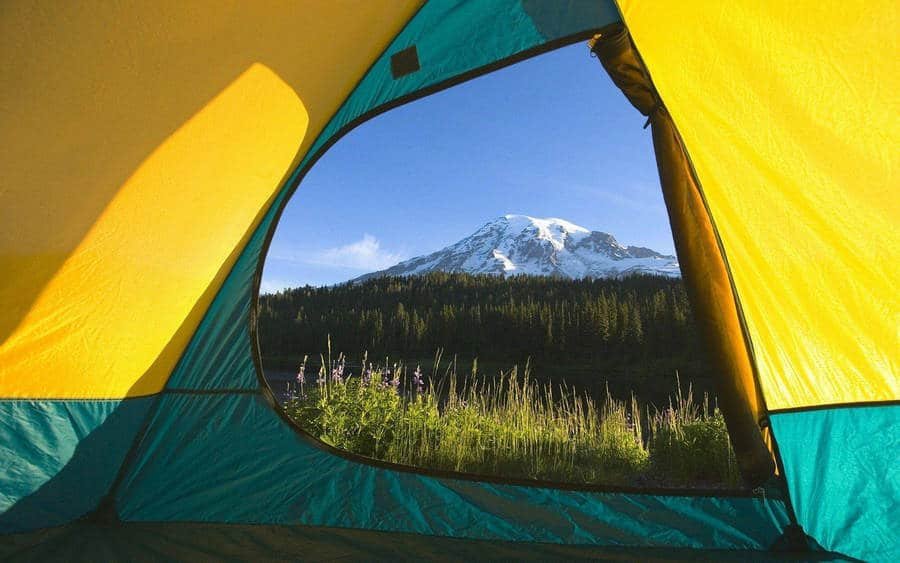Have you seen an old movie called ‘Congo’ from 1995? As I scratch my head, trying to recall the plot, a talking gorilla comes to mind. Also the legendary ‘Bruce Campbell’ who got eaten in the first two minutes. It even had ‘Ernie Hudson’, Mr Ghostbusters himself. But the standout moment was when they introduced a pop-up tent. Someone just threw an object into the air and out sprung a ready formed tent. Amazing! But is it any good? Can I just toss one on the floor while staying in the Sahara?
A pop tent isn’t suitable for any adventure. Often they aren’t sufficiently waterproof. Pop up tents aren’t usually as durable as traditional tents either. The lightweight material might not withstand rocky terrain or dense vegetation.
The most important takeaway from this article, I feel, is to look elsewhere when buying a tent. A pop up tent may be fine for local camping. But a foreign location with strong winds and heavy rain might have you praying for the mountain rescue team. If you are still interested let’s see what you should consider.
What to look for when purchasing a pop-up tent
Here are some factors you should consider when buying a pop-up tent, you’ll want to consider safety and durability, but there are other factors to consider:
- Ease of Setup – Let’s be honest, this is why you are considering this kind of tent in the first place. I’d want one that burst out fully formed otherwise what’s the point. Ease of use is a must!
- Durability and Construction – Look closely at the materials. Are you going to stand any chance in a storm? Is it a sturdy construction? I’d like to know it’ll last more than one trip to the campsite.
- Weather Resistance – When purchasing, check for weather resistance features. Is it waterproof? Does it have taped seams? Is the frame sturdy enough to cope with wind and rain? I’ve come across plenty of reviews saying the waterproof material wasn’t reliably waterproof! For those planning to camp in warmer climates, understanding the best gear for camping in extreme heat is crucial.
- Size and Capacity – Think about the tent’s size before you reach for the credit card. How many occupants? What gear are you taking? Are there any giants among you? So consider floor space and headroom.
- Portability and Weight – Think about the tent’s weight and packed size for storage and transportation. This should be another plus of purchasing a pop-up tent. They are usually lightweight and compact. Suitable for car camping, backpacking and traveling to different destinations.
- Ventilation and Airflow – You’ll also need proper ventilation to avoid condensation. Be on the lookout for mesh windows and vents. A good tent needs openings to allow fresh air to circulate, but don’t allow pesky insects to pay you a visit.
- Additional Features – Consider any other features that help with convenience and functionality. Look for storage pockets, gear lofts, or integrated lighting. Think about the requirements of your trip.
- Price and Value – Compare prices and features, you’ll want to determine the best value for your budget. It’s not a bad thing to think about brand reputation when reaching a conclusion.
Top pop-up brands to consider
- Moon Lence Instant Pop-Up Tents – Moon Lence tents have a good reputation among customers and reviewers. Their pop up tents are usually waterproof and windproof and may be suitable for mountaineering. They usually come with stakes for improved stability. Moon Lence tents are affordable and come with many features.
- Quechua 2 Seconds Tents – Sounds appealing – two seconds. You’ve traveled long hours, you’ve hiked to the middle of nowhere. Your wife won’t put up the tent for you. Never mind! Just throw it into the air ‘Congo’ style and it’s all done! I’ve always enjoyed the challenge of putting up a tent, but this sounds good!
- Coleman’s Night Cap Pop-Up Tents – Toss it on the floor and you are good to go. You’ll be sitting in a fold up chair sucking on a beer before you know it!
- Gazelle – Gazelle have a best of both worlds approach. They have a range of tents that are an easy 90 second set up. Their tents are waterproof and well ventilated. They are often spacious too. Also, they are probably more robust than the average pop-up tent.
- Hewolf – Hewolf tents are praised for their appearance by reviewers. They are good quality and are easy to set up.
- ABCOSPORT – They have a two person tent that is extremely popular. Again just fling it on the floor and you are all set. Its heavy duty construction means it is more durable than other similar tents.
Do professional mountaineers use pop-up tents?
I’m sure there was a mountaineer somewhere who used a pop-up tent, but generally speaking mountaineers do not use these kinds of tents when going on an expedition. The average mountaineer will come to the conclusion pop-up tents are not sturdy or durable in harsh environments and weather. Pop-up tents are used with breathable material which may lack the protection needed somewhere in the Himalayas. While exploring pop-up tent options, also consider if you need a 4-season tent for winter camping.
Tents that handle extreme environments offer more stability and security and this is what professional mountaineers demand. They usually use 4-season tents. Those especially designed to cope with mountaineering and winter camping. 4-season tents are made of thick materials. They resist tearing and abrasion. Often, they have more insulation and less ventilation in order to keep the occupants warm. Learn more about how to stop being cold when camping in winter, which is essential when pop-up tents don’t meet the mark.
Pop-up tents are better in mild and dry climates. But some models are better than others. Look for additional features such as waterproof coating, stakes, or a rain fly. A pop-up tent with extras will be more resilient in tougher weather.
Lastability
Don’t buy the cheapest tent, otherwise it might not make it through the night. The longevity of a pop-up tent will depend on a number of factors.
- Quality of materials – look for tents with durable materials such as polyester, ripstop nylon or canvas. Does the tent have a reinforced seam? Good zippers will help with durability.
- Construction – Are you looking at a well constructed tent? Pay close attention to the design, assembly and stitching. If it’s put together well it’ll be less likely to tear. And more likely to have a longer lifespan.
- Frequency of use – Like anything else, the number of times you use a pop-up tent will affect its longevity. If you love camping like me, frequent camping trips will be putting your tent to the test.
- Maintenance – You can prolong the life of any tent, pop-up or regular if you look after it. Keep it clean and remove any dirt or debris. I failed to store my first tent properly and it was murdered by mold.
- Storage Conditions – Store your pop-up tent in a dry area with good ventilation. Don’t store your tent when it is wet or damp. (easily done)
- Manufacturer’s Warranty – Warranties vary, but a good tent will usually come with two years protection. It should cover for defects in materials and workmanship. A good warranty may also include repair or replacement options in light of premature tent failures.
Conclusion
Pop-up tents are fun. It’s almost worth it just to see the look on friends and family members’ faces. Your kid’s eyes will pop out when you toss it on the floor and it springs to life. You’ll be reaching for a beer while your mate is looking to see if he has brought all of the tent polls.
You’ll love the convenience, ease of use and portability. Many models are extremely affordable too. They could be a cost effective solution to your camping needs. But overall, is it a good idea?
If you are off to your local campsite you’ll probably be just fine with a pop-up tent. If you are considering some of the wilder destinations as advocated in this blog, I’d look elsewhere.
There is a question mark hanging over a pop-up tent’s durability. Generally they are considered less durable than traditional tents. Rugged terrain and harsh weather may get the better of it. You won’t see them hanging around Everest base camp.
Think about your camping needs first and determine what tent is right for you.
Expert opinion
Popup tents are popular among campers and festival-goers due to their quick and easy setup, often taking just a few seconds[1][2][3]. They are lightweight, compact, and come in various sizes, making them suitable for different purposes, such as weekend camping trips, festivals, or even family camping[1][2][3]. While they are easy to use, it is recommended to practice folding them back into their carry bags, as the process can be specific and may require some practice[1]. Popup tents are generally not as durable as some other types, such as canvas tents, and may not be as well-suited to strong winds or harsh weather conditions[1]. However, they are an affordable and convenient option for those looking for a no-fuss tenting solution[1].
Citations and resources
[1] Expert Advice – Pop Up & Small Tents | World of Camping https://www.worldofcamping.co.uk/expert-advice/tents/pop-up-and-small-tents
[2] The best pop-up tents 2024: for easy, speedy pitching | Advnture https://www.advnture.com/buying-guides/best-pop-up-tents
[3] Best pop up tent 2023: The easiest and fastest tents to pitch https://www.expertreviews.co.uk/camping/1413334/best-pop-up-tents
[4] Best Pop Up Tents: easy to put up and waterproof – Which? – Which.co.uk https://www.which.co.uk/reviews/tents/article/best-pop-up-tents-aA0y47T9lkrW
[5] Is a pop up tent right for you? (Quick review of this pop up tent if … – Reddit https://www.reddit.com/r/CampingandHiking/comments/p1g5id/is_a_pop_up_tent_right_for_you_quick_review_of/
Extra
Curious about the mathematics surrounding the pop-up tent? Check out this Scientific American article.

